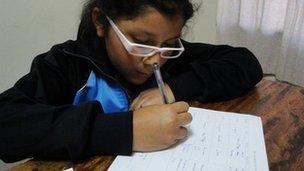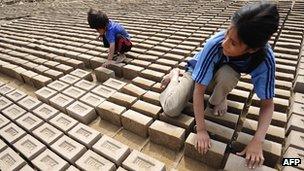Peru aims to end child labour but some see case for work
- Published

Xiomara attends school but also helps her mother sell corn at a market
Dawn is about to break on Calle Berlin of Miraflores, a commercial district of the Peruvian capital, Lima, and late-night revellers pour out of the trendy bars that shut after a weekend of non-stop music and fun.
A chorus of laughter and chatter echoes on the street. Wearing skimpy dresses and tight t-shirts, the young Lima residents seem unconcerned about the chilly wind blowing in from the Pacific Ocean.
They also seem indifferent to a small army of much younger vendors that is mingling among them.
They are all children, most under 10 years of age, selling cigarettes and chewing gum to a crowd inebriated with alcohol.
An eight-year-old gives me a blank look when asked why he is not in bed at this late hour.
"Can you buy me some sweets?" he replies.
Sebastian sells 10 mango or strawberry-flavoured sweets for one Peruvian sol, the equivalent of about 40 US cents or 20p.
The Peruvian government wants these children off the street and in school.
Life lessons
President Ollanta Humala recently promised that he would fight for the complete eradication of child labour.
"My dream is to have no more children working by the end of my term," he said.
His remarks were applauded by the <link> <caption>International Labour Organisation</caption> <altText>ILO</altText> <url href="http://www.ilo.org/ipec/lang--en/index.htm" platform="highweb"/> </link> , which praised Mr Humala for putting the issue at the forefront of his political agenda.
The Geneva-based organisation estimates that one in 10, or 14 million children in total, work in Latin America, most of them in agriculture and because they live in extreme poverty.
But in Peru, the rate is much higher.
More than two million boys and girls work - about 28% of all children between the ages of six and 17.
Bolivia and Guatemala have similar rates.
Carmen Moreno, the director of the ILO for the Andean region, thinks that Mr Humala's plan to boost primary and secondary school attendance, and enforce a nationwide employment ban for those under 14 years of age, is not only achievable but should also be a national priority.
"Children are not short adults," she says. "They are people who have to forge their personal development, culture and future, and this future can only come with education.
"No matter how many hours children work, it stops them from attending school regularly. And this is dangerous for their personal development."

Children at work: Beneficial or harmful for them?
Janeth Urcuhuaranga, a facilitator at Manthoc, a national organisation that represents some 2,500 child workers, disagrees.
She believes that children have a right to work and it is not the government's role to tell them not to exercise it.
"Children always worked during the Inca times," she says, "and even did so in Europe, to contribute to the welfare of the family.
"But now we are telling children not to farm the land nor go fishing with their family.
"We are demonising child employment and saying that we're taking their childhood away from them."
Being useful
In an adjacent room at the Manthoc centre in Lima, eight-year-old William plays with other boys of his age.
On weekends, he sells lollipops on the street and gives his earnings to his mother, "so that she can buy food".
As William speaks about the pride he feels being able to contribute to his family's income, Andy and Xiomara, both 11, nod their heads.
"I wouldn't choose not to work if that was possible, because I prefer working over doing nothing," says Xiomara, who helps her mother selling corn at the market.
"I'm not interested in making money," says Andy, who sews leather shoes in a factory. "What I want to do is to help people and feel like I'm useful." He dreams of becoming a civil engineer.
Another girl, Geraldine, who is 14, points out that she and all the other children at Manthoc go to school and do their homework every day.
She has been working since she was six, and believes that it has helped her.
"Working makes us more responsible and confident," she says.
The Manthoc boys and girls agree that selling cigarettes on the street late at night is not what a child should be doing, and that children should not be employed in Peru to mine for gold in conditions that are often described as inhuman even for adults.
But they speak of the clear distinction between what they believe is dignified labour - on a part-time basis without affecting a child's education - and what is abuse.
"Sexual exploitation, child trafficking, children carrying weapons... Those aren't jobs," says Ms Urcuhuaranga. "They're simply crimes that need to be severely sanctioned."
She says that government initiatives to raise the minimum wage and improve education are welcome, but that they should be used to eradicate extreme poverty, not child labour.
- Published12 April 2012
- Published20 September 2011
- Published18 April 2011